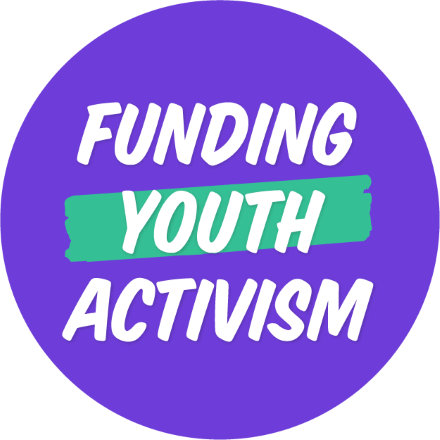Learning for funders
Don’t wait for young people to be ready
We’ve heard young people question the split between ‘adults’ and ‘young people’ when it comes to leading change. Adults can think about how they can support young people making change right now: what resources can they share with young people as fellow changemakers; what spaces can they make and open for young people to create and configure their plans; what deep listening and two-way conversations can they hold with young people?
Why fund young people’s activism?
There is a pipeline of young people who want to make change.
Young people who experience injustice have very clear ideas about what they want to change, and more funding is needed. When investment happens, projects can be time-limited and restrictive. Funding should be flexible enough to respond to emerging change that young people want to make, and what is happening in the external political environment.
What sort of funding is needed?
To make real change, young people need time and space to learn how power works, in all its dimensions. This deep work can’t always be done ‘at scale’ although its reach and influence can be enormous. It involves: learning about histories, society and communities; developing tactics, networks and skills; building trust and belonging. Funding youth change can be a slow burn but with powerful outcomes.
“We are dynamic, we are all so different and so we need different things to fulfil us. In our role we are expected to challenge government but this takes time.”
Youth participant at funded organisation, Act for Change Fund
Well-being and mental health
Young people with lived experience of injustice and inequality who campaign must always have their wellbeing fully supported and funded, including specialist support. While action for change can bring specific challenges, there can be real benefits for mental health and wellbeing in being part of a supportive changemaking community.
“Making change can be heavy, but it can also make you strong”: young person. Find out more in our video.
How does youth activism relate to other areas of youth work?
Youth leadership and youth development can happen side-by-side with youth changemaking. The kinds of hard and soft skills that young people develop and deploy when they make change are absolutely relevant to young people’s well-being, the world of work and beyond.
What is the role of adults in youth-led change?
The starting point is that young people and adults are equal partners for change: partners who have both shared and different experiences – and almost certainly disparate material resources. Supporting young people to lead change will involve adults thinking hard about the power they hold, and working out when to share it with, make space for and give power up to young people.
